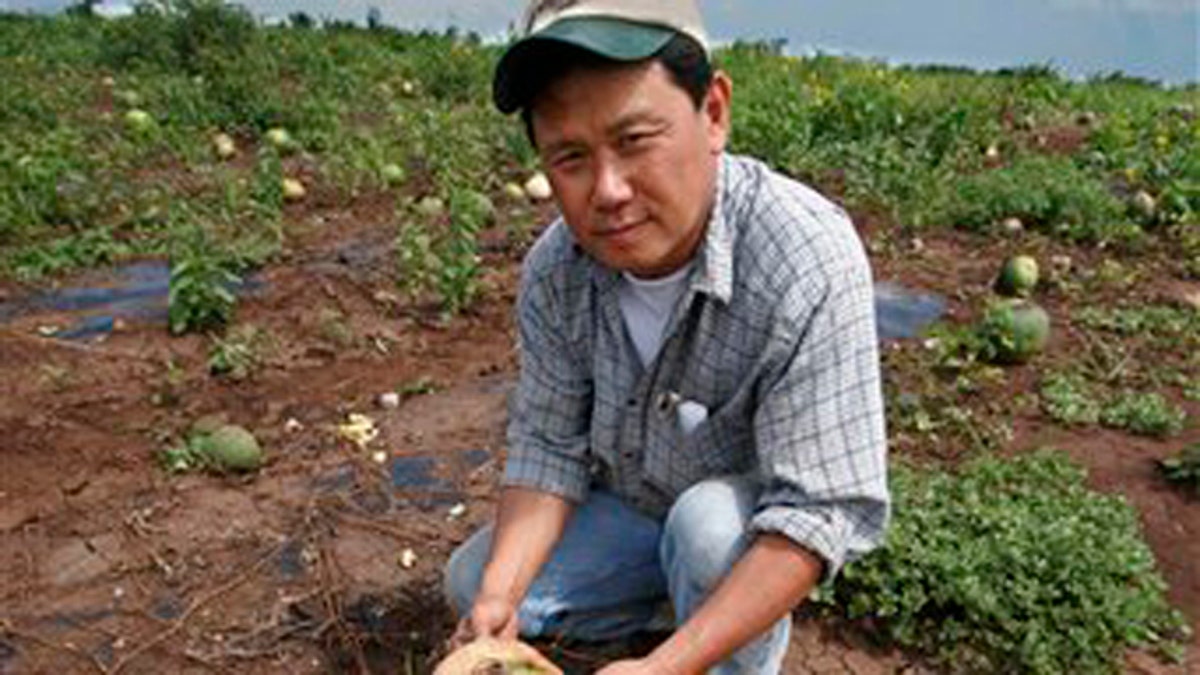
Hawaii's Alou Farms heads to court in human trafficking case. (AP)
HONOLULU -- Two brothers who run one of Hawaii's largest vegetable farms are going to trial this week on federal charges they illegally shipped 44 workers from Thailand, housed them in dirty metal containers and forced them to work for little pay.
Alec and Mike Sou of Aloun Farms each face up to 20 years in prison without parole if found guilty after they backed out of a plea deal last September that came with a five-year maximum sentence. The trial opens with jury selection Wednesday.
Federal prosecutors claim the Sou brothers gamed the United States' guest-worker visa system in a way that economically trapped the rural north Thailand laborers on the 3,000-acre Oahu farm, which grows a variety of foods including lettuce, apples, bananas, parsley, watermelon and pumpkin year-round in Hawaii's mild climate.
The Sou brothers and Thailand labor recruiters targeted poor workers in 2003 to work on the farm, promising them three years of work for six days a week at $9.60 an hour, according to prosecutors' trial brief filed last week. The workers paid about $20,000 in recruiting fees -- some of which went to the Sous -- but they learned after arriving in Hawaii they would be paid much less, and their visas would only last for a few months, the brief said.
The workers were told if they complained about wages or living conditions, they'd be deported to Thailand with no way to repay their debts, prosecutors wrote. The result would be they'd lose their family land and homes, their attorneys have said.
"Having paid the recruitment fees, they had no other option but to continue working," said Melissa Vincenty, who represents 34 of the workers. "It's forced labor when you put someone in a position of indentured servitude."
The Sous' attorneys reject those accusations, saying there was no forced labor because the workers could have just quit, and consequences in Thailand weren't the Sous' responsibility.
"At most what they did was tell people ... the natural consequence of them not doing their job, which is you lose your job. Can that even be a crime?" asked Thomas Bienert, who represents Alec Sou, following a hearing Monday.
The Sous never physically hurt or threatened to hurt anyone, Bienert said.
"There were certain financial obligations that these workers had in Thailand that were separate and apart to their employment with Aloun Farms," said Thomas Otake, who represents Mike Sou.
Accusations of worker mistreatment by Aloun Farms are similar to the government's claims in a separate case pending against Los Angeles-based labor recruiting company Global Horizons, which prosecutors have described as the largest human trafficking case ever prosecuted in the United States. Global Horizons allegedly exploited 600 Thai workers to work on U.S. farms, including Aloun, prosecutors have said.
The Sous risked trial rather than accept a plea agreement after the brothers disputed some of the facts they had previously accepted in the deal.
They acknowledged violations of the U.S. agricultural guest worker program, but they denied mistreating workers, underpaying them or withholding their passports to confine them to the Kapolei-based farm, which is a key source of vegetables to the isolated islands' food supply.
Some of the Sous' admissions before their plea deal was thrown out by Chief U.S. District Judge Susan Oki Mollway may be used against them.
Mollway on Monday rejected a motion to disqualify the Sous' statements made to prosecutors and agents as part of the plea bargain
The trial may last for weeks, and the government has submitted a list of at least 52 witnesses it plans to have testify, including 18 of the Thai workers.
Mollway has said she hopes the trial concludes by Labor Day on Sept. 5.









































